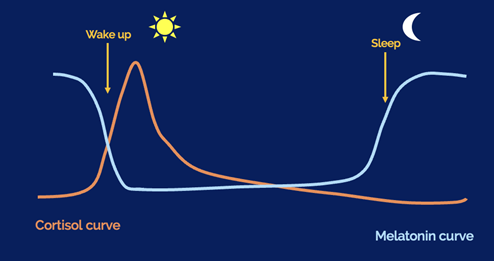
What is Cortisol and How Does it Affect Sleep?
Cortisol is often called ‘the stress hormone’ and it’s easy to assume that we want less of it. In fact, both too much and too little cortisol can cause problems for our sleep and energy levels.
So what do healthy cortisol levels look like, and what can you do to manage your cortisol?
What is cortisol? What effects does it have in the body?
Cortisol is a steroid hormone produced by the adrenal glands; two tiny glands sitting on top of the kidneys. When your brain recognises a danger, it triggers a cascade of reactions called the ‘fight or flight’ stress response. This ancient reaction evolved to help our ancestors’ ability to fight, flee, or freeze in response to a predator. Although we rarely encounter sabre-toothed tigers anymore, the brain responds to perceived threats in a very similar way today. Specifically, the brain triggers a network called the HPA axis to release stress hormones: first adrenaline, and then cortisol.
Cortisol travels around the body in the bloodstream and affects receptors which can be found in many tissues in the body. Cortisol’s effects include:
- Promoting the release of glucose into the blood stream, to give us energy
- Breaking down muscle and fat, also for energy
- Increasing blood pressure
- Reducing inflammation (this conserves the immune system)
Even when we don’t feel stressed, we still produce cortisol according to a daily, or circadian rhythm. There is a large spike in cortisol as we wake up in the morning, called the Cortisol Awakening Response, which gives us the energy to get up and start the day. Levels of cortisol typically decline towards bedtime, and hit their lowest levels during the night.
How does cortisol affect our sleep?

The diagram above shows the natural daily rhythm of cortisol, and the hormone melatonin, which is released in darkness and prepares the body for sleep.
Cortisol is an energising hormone that promotes wakefulness. Cortisol naturally declines throughout the day, but if something happens to increase cortisol levels in the evening (see triggers section below!), it can disrupt the normal pattern of melatonin production.
Cortisol suppresses melatonin and also interferes with adenosine, the neurotransmitter that makes you feel sleepy. So, if you have raised cortisol levels as you head towards bedtime, you are more likely to struggle to fall asleep. Sleep also becomes lighter, and you are more likely to wake up during the night.
Broken sleep or short sleep can actually increase the sensitivity of the stress response, leading to higher cortisol levels the night day, and a risk of continued poor sleep. This can become a vicious cycle: lack of sleep raises cortisol, which disrupts sleep, which makes you more likely to feel stressed, which further disrupts sleep.
What are the signs of too much, or too little cortisol?
A rise in cortisol levels might be a cause of disrupted sleep. If we are exposed to too much cortisol, for too long, we can also develop a set of symptoms known as Cushing syndrome. This includes:
- Weight gain, especially around the abdomen and upper back
- Muscle wasting of the arms
- Round face, often called a ‘moon’ face
- Low energy and motivation
- Sleep problems
- Increased urination
- Bruising more easily
- Increased vulnerability to illness and infection
- Low libido
- High blood pressure
- Irregular or absent periods, extra facial and body hair in women
In contrast, Addison’s disease happens when your adrenal glands produce too little cortisol. This can cause symptoms including fatigue, muscle weakness, loss of appetite, weight loss, irritable mood, increased thirst, muscle cramps, irregular or no periods.
Many of these symptoms of cortisol disruption are non-specific, and so if you suspect either high or low cortisol, it’s always best to consult your doctor.
What factors could increase cortisol at night, and disrupt sleep quality?
Triggers for the production of cortisol can be any ‘stressor’ which pushes the body out of its normal range. There are three main factors that could increase cortisol levels at night:
i. Psychological stress
If you are coping with any of the following types of situation, your brain may respond by triggering the release of cortisol:
- A perceived threat to you or your family, in terms of your safety, or your status
- Lack of control or predictability
- Sleeping in a new environment
Many chronic stressors fit these criteria, for example financial stress, a health condition, a new job or relationship problems. During the covid pandemic, many people experienced situations which felt threatening, that were outside their control. This is likely to be one reason behind ‘covidsomnia’ an increase in sleep problems during the pandemic.
ii. Physiological stressors
There are many factors that can put your body out of balance, and promote a stress response:
- Poor diet - especially one high in sugar, and processed foods
- Inconsistent sleep-wake patterns, which cause disruption to your circadian rhythms, such as those caused by shift work
- Lack of sleep
- Intense exercise without sufficient recovery
- Fluctuations in sex hormones, for example around the menopausal transition
- Chronic illness: especially those conditions which directly impact cortisol production such as tumours of the adrenal gland, or the pituitary gland which signals the adrenals to switch on cortisol
iii. Medication
The drugs used to treat asthma, arthritis and some other conditions often contain corticosteroids, which behave in the body in the same way as cortisol. These include prednisone, cortisone and dexamethasone. Your doctor will always recommend the lowest effective dose, for the shortest time required, so it’s important to take these medications exactly as prescribed. If you have any concerns about steroid medication, speak to your doctor who can advise on how you might gradually taper your dose.
How can you promote healthy cortisol levels, and better sleep quality?
1. Strive for consistent sleep-wake patterns
If you’re reading this because you have broken sleep, the knowledge that better sleep will help to reduce your cortisol levels will be of little comfort! However, it is possible to improve sleep quality simply by sticking to a more regular schedule. Try to always get out of bed at the same time, 7 days a week, no matter how well you slept the night before. Only get into bed when you’re ‘sleepy-tired’, but aim for a similar time each night. Aim for a minimum of 7 hours of sleep each night.
2. Proactively manage chronic stress
If you know that you’re under stress, consider whether there is anything you could do to lessen the impact on you by exploring these 4 areas:
i) Address the source of stress:
Some stressors can be tackled at the source, such as stress at work e.g. by speaking to your manager about extending deadlines, or getting help with prioritisation. Other stressors are harder to change, such as a chronic illness affecting a family member. Consider whether there is a small action you could take to reduce stress at the source.
ii) Increase your ability to cope with resources or skills:
Stress happens when we exceed our perceived ability to cope. The same situations will affect people very differently, based on their previous experience, and the support they have available. Consider whether you have tackled anything similar in the past. What happened? Are you more capable than you have been giving yourself credit for? You might be able to do some training, or seek support from friends or family, or get advice from others going through a similar situation, to help equip you to deal with this challenge.
iii) Practice the skill of relaxation:
Stress affects both our minds and our bodies. Positively, by relaxing our bodies, we can also reduce the tendency of the mind to worry. When you’re stressed, it can feel extremely difficult to relax! It’s a skill, best practiced a little and often.. Try progressive muscle relaxation, where you gradually tense and then relax all of the muscles in the body. Start with your toes: tense for 5 seconds, and then release. Focus on enjoying the feeling of tension leaving the body. Move all the way through the body in this way for 5-10 minutes. Try to unwind and allow yourself to relax at least 30 minutes before getting into bed.
iv) Process unhelpful thoughts:
If you can’t sleep at night because thoughts keep going round and round in your head, it might help to write them down. I recommend taking 15 minutes every day to download your worries, or thoughts which keep you awake at night. Try to do this well in advance of bedtime. You may notice that many of the thoughts concern things which are out of your control, and therefore worrying about them doesn’t help you. If this is the case, acknowledge the thoughts, then put a line through them. If the same thoughts return, remind yourself that they are out of your control, and let them go.
3. Choose a healthy diet
The foods you eat may help to manage your cortisol levels. A study in monkeys found that eating a Mediterranean style diet, with plenty of fruits and vegetables, and high fibre, was associated with lower cortisol levels (Shively et al 2020). One study found that higher levels of omega-3 fatty acids in the diet were associated with lower evening cortisol levels (Thesing et al 2018). Certain supplements, known as adaptogens, may help reduce stress and cortisol, but further research is needed. You can find out more about popular supplements to reduce stress and improve sleep here, including ashwaganda and chamomile.

Dr Sophie Bostock - Dr Sophie Bostock
Sophie brings a wealth of expertise to the role having spent the last six years researching and championing the importance of sleep science in NHS and corporate settings. Sophie was responsible for improving access to the award-winning digital sleep improvement programme, Sleepio, as an NHS Innovation Accelerator Fellow. She has delivered hundreds of talks, including for TEDx and Talks@Google, and regularly features as a media sleep expert.